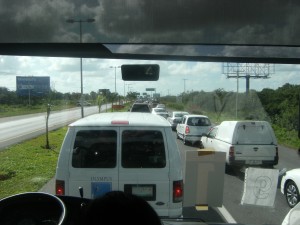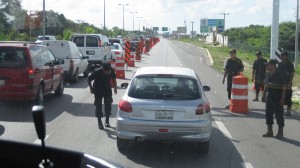Sulla strada che porta al COP16.. On the road to COP16
IN ENGLISH BELOW
100 minuti. Questo è il tempo che ho passato sull’autobus questa mattina per raggiungere il centro CancunMesse per assistere alla riunione plenaria del COP16 – da notare che questo non è il posto dove si tengono le negoziazioni, ma è il padiglione degli stand della società civile. I negoziati avvengono, infatti, al Moon Palace, un altro centro sito a una quindicina di minuti di autobus dal CancunMesse.
100 minuti in coda sulla superstrada. Magari questo è un segno, così come per ricordare che raggiungere l’obiettivo qui a Cancun richiederà molto tempo e che non bisogna essere impazienti di fronte possibili rallentamenti o blocchi?
Come già accennato ieri, l’Unione Europea deve prendere azioni e posizioni chiare su diversi argomenti. L’argomento più “caldo” è costituito dalla posizione che l’Unione Europea avrà riguardo il futuro del protocollo di Kyoto. Sebbene si dia per scontato che l’UE voglia prolungare le proprie responsabilità assicurando che al protocollo di Kyoto faccia seguito un secondo periodo di impegni, questo deve essere ben specificato dagli stati dell’Unione.
Intanto l’Italia ancora non destina i fondi promessi ai paesi in via di sviluppo come aiuto per il triennio 2010 -2012. Dipende da cosa sta accadendo in Italia ora? Quanto pensiate che la crisi politica italiana potrà influire sul mandato dei negoziatori qui presenti? Il clima di confusione all’interno dello scenario politico italiano potrà avere ripercussioni sulla nostra posizione?
A livello europeo, alcuni esponenti dell’Unione anche oggi hanno ricordato come sia fondamentale trovare una soluzione globale al problema dei cambiamenti climatici, sottolineando il fatto che molto probabilmente la soluzione finale non verrà fuori dal questo meeting di Cancun.
L’Unione Europea si dichiara sempre pronta nel raggiungere un accordo ma anche consapevole che non tutti i paesi lo sono.
A questi fase di incertezza bisogna aggiungere quanto sta accadendo a livello diplomatico internazionale in seguito ai file rilasciati da Wikileaks. Avranno delle conseguenze sui negoziati di Cancun? Faranno rallentare il processo?
Certo è davvero curioso come l’anno scorso praticamente alla vigilia del COP15 uscirono le mail rubate ad alcuni scienziati (noto come climate gate) che misero a dura prova la credibilità del pannello sui cambiamenti climatici, mentre proprio oggi - nella prima giornata del COP16 - vengono fuori altre dichiarazioni che coinvolgono anche il segretario generale dell’ONU e che potrebbero avere delle conseguenze sui negoziati. Semplici coincidenze?
Tutto sommato i negoziatori qui sembrano ritrovare pian piano la fiducia su una buona riuscita di questi negoziati.
In effetti anche noi, dopo aver aspettato in fila per 100 minuti abbiamo trovato la strada improvvisamente spianata. Che non succeda anche per i negoziati?
Acronimo o termine del giorno:
QERCs: Quantifed emission reduction commitments = impegni nella riduzione delle emissioni quantificabili.
Affinchè si possa procedere positivamente nei negoziati i paesi sviluppati sono invitati a quantificare i loro impegni riguardo la riduzione delle proprie emissioni.
IN ENGLISH
100 minutes. This is the time I spent on the bus this morning to reach the center CancunMesse to attend the plenary meeting of the COP16 - note that this is not the place where the negotiations are held, but the pavilion where the side events take place and where are all the civil society’s booth.
In fact the negotiations take place at the Moon Palace, another centre located about fifteen minutes by bus from CancunMesse.
100 minutes in the queue on the freeway. I asked myself if this was a sign. Is it a reminder of the fact that the achievement of our goal here in Cancun could take a long time and that we might face possible delays or blocks?
Anyway, as mentioned yesterday the European Union must take actions and clear positions on various topics. Especially regarding the Kyoto Protocoll: What is the position that the EU will have on the future commitment? Although most of the time it is taken for granted that the EU will extend its responsibilities by ensuring a second commitment period, this must be clearly shouted out.
Meanwhile, Italy hasn’t gave yet the money promised to developing countries for the years 2010 -2012. It depends on what is happening in Italy right now? How much our political crisis will affect on the mandate of the negotiators here?
Regarding Europe, some EU officials have said today that it is important to find a global solution to tackle climate change, highlighting the fact that most likely the final solution will not come out of this meeting in Cancun.
The European Union declares itself ready to reach an agreement but also aware that not all the countries are.
At this uncertainty must be added what is happening in the international diplomatic level: will the files released by Wikileaks have consequences on the negotiations in Cancun? Will they slow down the process?
Of course it’s really curious how last year, practically on the eve of COP15 ¸the “climate gate” became public putting a strain on the credibility of the scientific world, while today (the first day of the COP16) other statements that involve also the general secretary of the UN come out - and which could have consequences on the negotiations. Mere coincidence?
All in all, the negotiators here seem to slowly regain trust for a successful outcome.
In the end is what happened to us.. after waiting in line for 100 minutes we found the road suddenly clear. We cant it happen for the negotiations as well?
Acronym or world of the day:
QERCs: Quantifed Emissions Reduction Commitments
In order to positively proceed in the negotiations, developed countries are asked to quantify their commitments regarding the reduction of their emissions.




About the author
Andrea Cinquina
Andrea Cinquina è un ragazzo italiano di trenta anni, nato e cresciuto a Pescara, in Abruzzo. Laureato in Economia Ambientale presso l'Universitá di Pescara, ha frequentato un master internazionale di due anni in Svezia sugli studi ambientali e le scienze sostenibili.


